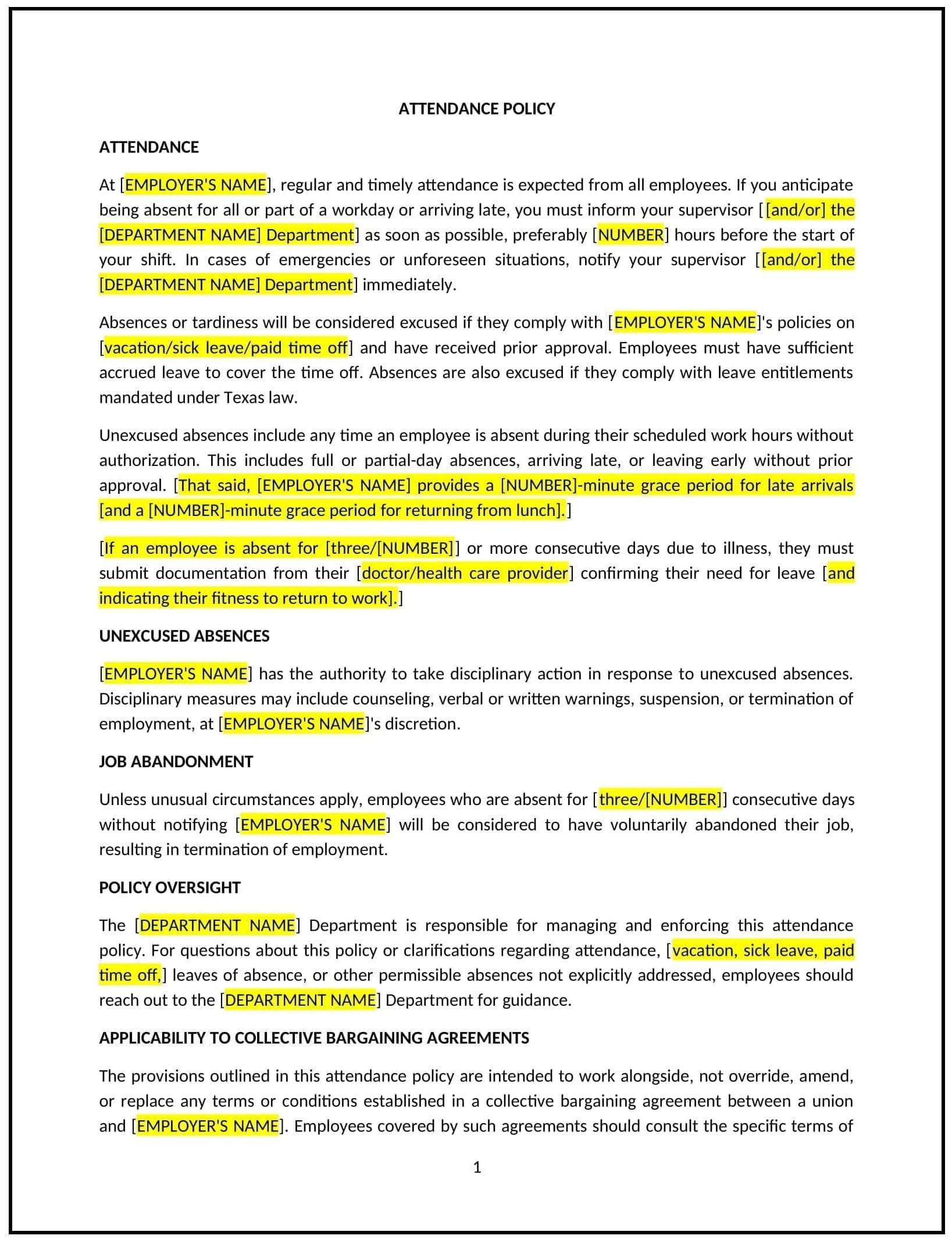Got contracts to review? While you're here for policies, let Cobrief make contract review effortless—start your free review now.

Customize this template for free
Attendance policy (Texas)
This attendance policy is designed to help Texas businesses establish clear guidelines regarding employee attendance and punctuality. Whether businesses are managing expected work hours, handling absenteeism, or promoting a productive work environment, this template provides a structured approach to maintaining reliable attendance while ensuring fairness and consistency.
By adopting this template, businesses can ensure smooth operations, reduce disruptions caused by absenteeism, and set clear expectations regarding employee attendance.
How to use this attendance policy (Texas)
- Define attendance expectations: Clearly specify the hours during which employees are expected to work, including arrival times, lunch breaks, and end-of-day times.
- Set reporting procedures for absences: Outline the process employees must follow to report absences, including how much notice is required and who to notify in case of illness or emergencies.
- Address acceptable reasons for absences: Provide guidelines on what constitutes acceptable reasons for time off, such as personal illness, family emergencies, or pre-approved time off.
- Establish attendance records: Keep accurate records of attendance, including absences, tardiness, and early departures, to track patterns and identify potential issues.
- Specify consequences for excessive absenteeism or tardiness: Clearly outline the disciplinary actions for repeated absenteeism or tardiness, including warnings, suspension, or termination, depending on the severity of the issue.
Benefits of using this attendance policy (Texas)
This policy offers several benefits for Texas businesses:
- Ensures reliable attendance: Clear guidelines help employees understand the importance of punctuality and regular attendance, contributing to consistent productivity.
- Reduces disruptions: A well-defined attendance policy helps reduce disruptions caused by excessive absenteeism or tardiness, maintaining smooth workflow and minimizing impact on team performance.
- Encourages fairness: Establishing consistent attendance rules ensures that all employees are held to the same standards, avoiding potential bias or unfair treatment.
- Promotes employee accountability: Employees are more likely to take responsibility for their attendance and adhere to company expectations when they clearly understand the policy.
- Improves operational efficiency: A structured attendance policy helps businesses manage staffing levels more effectively, making it easier to plan for workloads and prevent overstaffing or understaffing.
Tips for using this attendance policy (Texas)
- Communicate expectations clearly: Ensure that all employees are aware of the attendance policy, including the reporting process and the consequences of excessive absenteeism or tardiness.
- Implement tracking systems: Use time-tracking systems to monitor attendance and ensure that records are accurate and up-to-date.
- Address patterns of absenteeism early: If an employee begins to display a pattern of absenteeism or tardiness, address the issue early through informal discussions or formal warnings to prevent further disruptions.
- Offer flexibility when possible: While attendance is crucial, offer flexibility for legitimate reasons like family emergencies or illness, where possible, to support employees’ needs while maintaining operational efficiency.
- Review regularly: Update the policy periodically to reflect changes in business operations, New Texas state laws, or feedback from employees regarding attendance expectations.